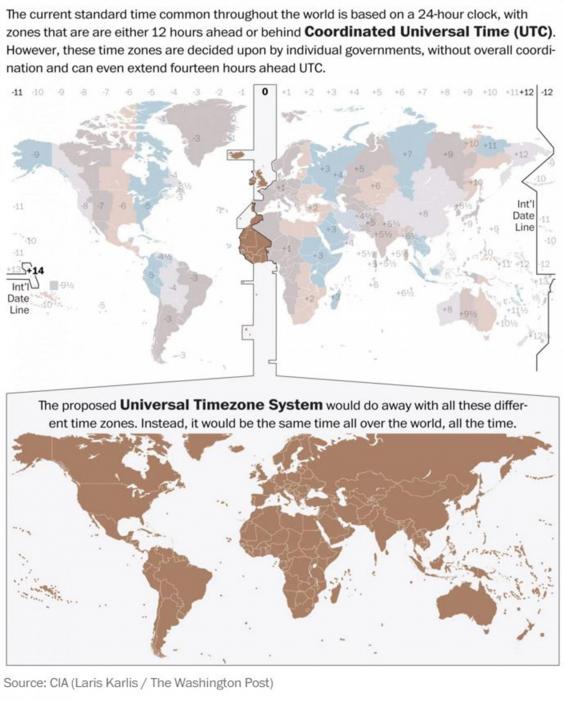
Researchers have concluded that having multiple time zones across the planet is a relic of the past and should be replaced with “Universal Time.”
The new way of conducting human affairs via instant interaction on the internet necessitates a single unit of time, which is the true state of affairs anyway – everything is always happening now.
Solar time could be applied locally in lieu of the fact that humans need sleep, while international trade and interactions could benefit from always being placed in the present time unit- “Universal Time.”

BYPASS THE CENSORS
Sign up to get unfiltered news delivered straight to your inbox.
You can unsubscribe any time. By subscribing you agree to our Terms of Use
Latest Video
The Independent reports:
Last Summer, North Korea did something a little odd. On the 70th anniversary of Korea’s liberation from Japanese occupation, the closed and authoritarian state announced it was permanently turning its clocks back half an hour. The country was creating its own time zone: Pyongyang time.
As a plan, it didn’t make a lot of sense. Many, understandably, interpreted it as just another example of Pyongyang’s characteristically illogical policy logic. Yet Pyongyang time also highlighted something else. All around the world, time zones make little sense. Russia currently has 11 time zones, while China just has one. Spanish people are said to be constantly tired because they are in the wrong time zone. Nepal is –inexplicably – the only country in the world to have a time zone that is set to 15 minutes past the hour.
Looking over this chaotic landscape, it’s reasonable to ask: Are time zones inherently flawed? That’s what Steve Hanke and Dick Henry think.
A few years back Hanke, a prominent economist with Johns Hopkins University and a senior fellow with the CATO Institute think tank, and Henry, a professor of physics and astronomy at Johns Hopkins, teamed up to propose a new calendar designed to fix the inefficiencies of the current one. The plan, dubbed the “Hanke-Henry Permanent Calendar,” Last month, after reading a WorldViews story about Pyongyang time, Hanke reached out to us to detail another idea that he and Henry had devised to fix the chaos caused by time zones.
The plan was strikingly simple. Rather than try to regulate a variety of time zones all around the world, we should instead opt for something far easier: Let’s destroy all these time zones and instead stick with one big “Universal Time.”
Does that sound extreme? Perhaps, but perhaps not. The map below gives you an idea of what the world looks like now, and what it would like if we instead stuck to single system of Universal Time. The logic of Universal Time is strikingly simple: If it’s 7 in the morning in Washington D.C., it’s 7 everywhere else in the world too. There are no time zones. Wherever you are, the time is the same.
While it may ultimately simplify our lives, the concept would require some big changes to the way we think about time. As the clocks would still be based around the Coordinated Universal Time (the successor to Greenwich Mean Time that runs through Southeast London) most people in the world would have to change the way they consider their schedules. In Washington, for example, that means we’d have to get used to rising around noon and eating dinner at 1 in the morning. (Okay, perhaps that’s not that big a change for some people.)
But in many other ways, Hanke and Henry argue, the new system would make communication, travel and trade across international borders far, far easier.
Washington Post’s WorldViews recently conducted an interview over email with Hanke and Henry in which they explained why time zones had to go, why Universal Time was a better system, and why the time has also come for their proposed calendar reform. The exchange, lightly edited for clarity, is below (Hanke and Henry gave joint responses to the questions).
WorldViews: It was mentioned in a previous email that there were around five countries who changed their time zones last year. Is this a large number for one year?
Hanke and Henry: It is about par for the course. It remains a political football, which would disappear if our ideas were adopted.
WV: So why do countries change their time zones?
HH: Usually for political reasons, but sometimes for economic reasons. We are on the right side of history: Look at the U.S., where local time in each city was the norm until the railroads came, and time zones were created. Sandford Flemming, a Scottish-Canadian railway engineer, was the first to propose a system of world-wide time zones in 1889: “the twin agencies steam and electricity” annihilated distances and made reform necessary. Today the agency of the Internet has annihilated time and space completely, and has set us up for adoption of world-wide time.
WV: What problems have time zones created around the world?
HH: [Former President Dmitry] Medvedev consolidated Russian time to some extent in 2010, but these reforms have been undone by the Duma in July 2014. Bungled implementation of a good idea. Now North Korea has adopted a half-hour difference between Chinese time and Japanese time. Confusion abounds! Indonesia, where one of us (Hanke) was [former President] Suharto’s chief economic advisor during the Asian financial crisis of 1998, is a large country that you should keep your eye on, as they have proposed to abolish two of their three time zones for economic reasons. That would put Indonesia in the same time zone as Singapore.
WV: Do any time zone policies strike you as particularly egregious?
HH: You are asking if some strands of spaghetti are worse than others: they are all bad.
WV: So, the Universal Time Zone system. What lead you to argue so strongly for that option?
HH: Because from a physics point of view, there IS only one time! And this principle of physics lines up perfectly with the principles of economics. That is precisely why Hanke and Henry addressed this topic in a segment of a Johns Hopkins course on problems in applied economics.
Read more: independent.co.uk/news/world/americas/universal-time


